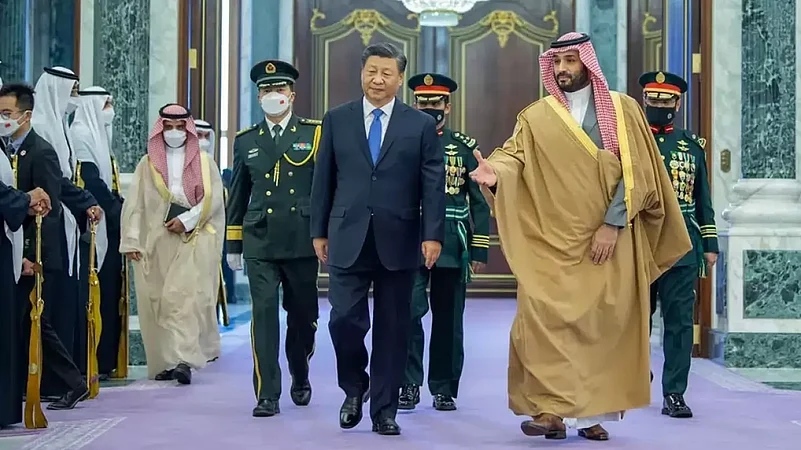Chinese President Xi Jinping’s meeting with Saudi Arabia’s king and crown prince Mohammed bin Salman has sent a signal to the West especially US, which Washington Post journalist David Ottaway wrote decades back: “Saudi Arabia was not seeking divorce from the United States; it was just seeking marriage with other countries”.
Xi Jinping’s Saudi Arabia Visit: Is It End Of Monogamy With US?
Saudi Arabia was also bitter after USA’s reaction to the Arab Spring, in which Washington pressured Egypt’s president at the time, Hosni Mubarak, to step down and encouraged democratic reforms elsewhere in the Middle East.

Ottaway’s prophecy came true to Thursday, when Jinping and Salman met. It is clear that oil rich nation Saudi Arabia is trying to recalibrate its foreign policy as US is turning its attention elsewhere in the world.
There is a reason to why Saudi Arabia wants China on its side and vice versa . Foremost is Russia’s war on Ukraine and USA’s hard stance on Moscow.
While another reason behind giving grand welcome to Jinping is Prince Salman’s desire of bolstering his image in the Gulf region.
Salman has created a certain image for himself after after being linked to the killing of Washington Post columnist Jamal Khashoggi.
Saudia Arabia while being aware of China’s oil purchases is conscious of the fact that the country’s construction expertise could be tapped. This is important for plans of Salman, who plans to build Neom city on Red Sea at a cost of 500 billion dollars.
China has already set its imprint in Saudi Arabia with its firms everywhere in the Gulf region.?
Behind Saudi Arabia’s handshake with China lies long list of strains with US
It includes ?9/11 terror attacks. It is said that 15 out of the 19 hijackers were Saudi nationals. There are questions also how much Saudi Arabia had the information about it. There is also the 2003 US invasion of Iraq. The attack left Shia-dominated regime in Baghdad vulnerable to Iranian influence.
Saudi Arabia was also bitter after USA’s reaction to the Arab Spring, in which Washington pressured Egypt’s president at the time, Hosni Mubarak, to step down and encouraged democratic reforms elsewhere in the Middle East.
A monarch led nation Saudia Arabia viewed the move as a threat to and Royal Family viewed it as a potential threat to its own hold on power.
The shale revolution which made US, Saudi Arabia’s competitor also didn’t go well with the latter.?
It was also former US President Barack Obama administration’s nuclear accord with Iran, whom Saudi Arabia considers its enemy.
In 2019, US weak reaction on Iran lead ?missile attacks ?on two key Saudi oil-producing facilities also made the matters worse.
Like Saudi Arabia, China’s Xi Jinping is also getting political cover for its world image
Saudi Arabia, which is home to the holiest sites in Islam, also has provided political cover to China over its harsh policies toward Uyghurs and other Muslim minorities.?
The Uyghur community in China have been facing nightmares under Xi led communist regime. Saudi Royal Family hasn’t uttered a word on the atrocities committed against Uyghur Muslims.
Besides, Xi Jinping’s first trip post Covid-19 pandemic is a step towards restoring his country’s world image.
Recently, there have been widespread protests against harsh Covid-19 restrictions across China, which scenes of dissent are a rarity.?
-
Previous Story
Massive Brawl In Turkish Parliament, Blood On Floor As MPs Engage In Fistfight
- Next Story



















